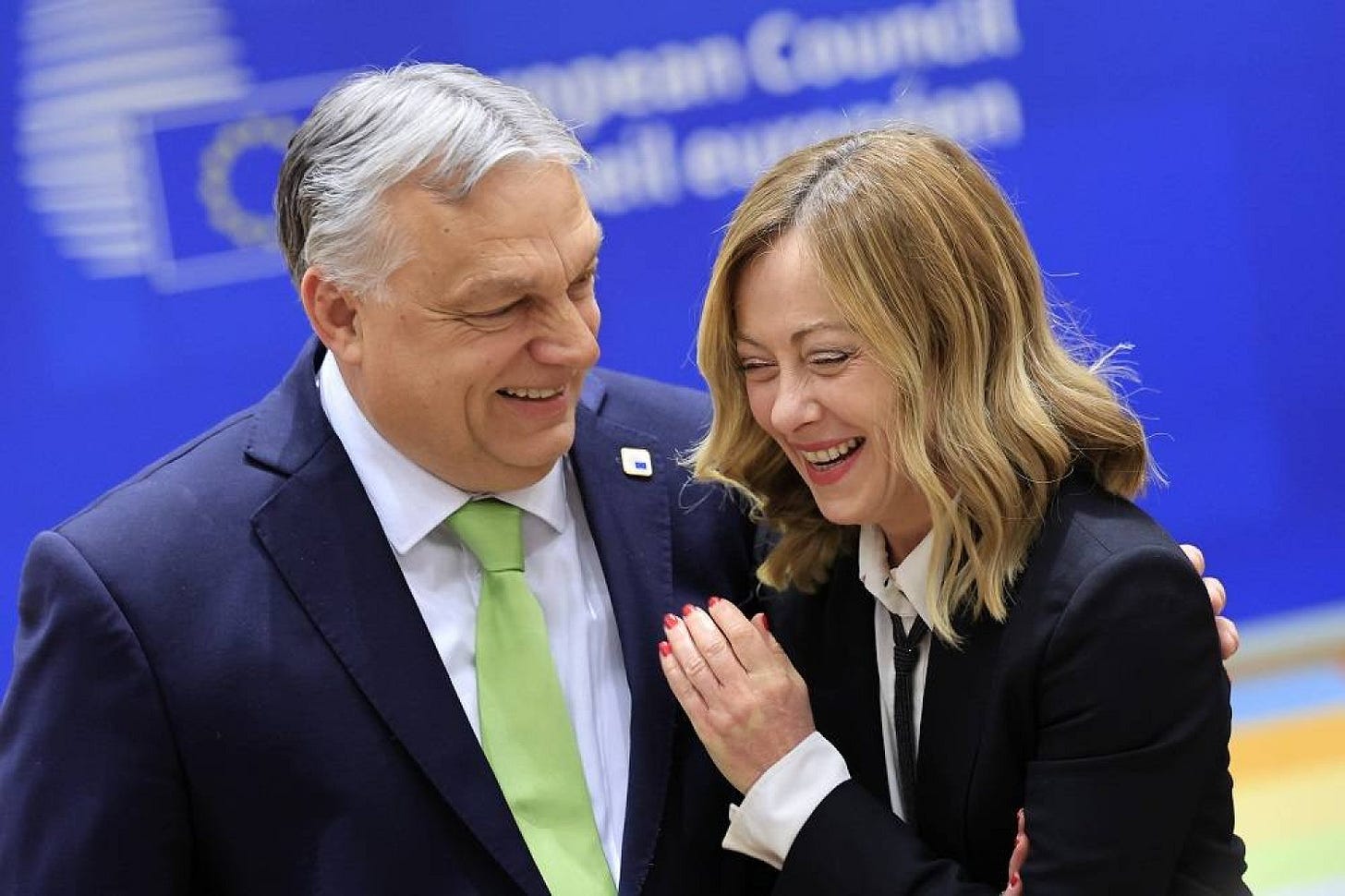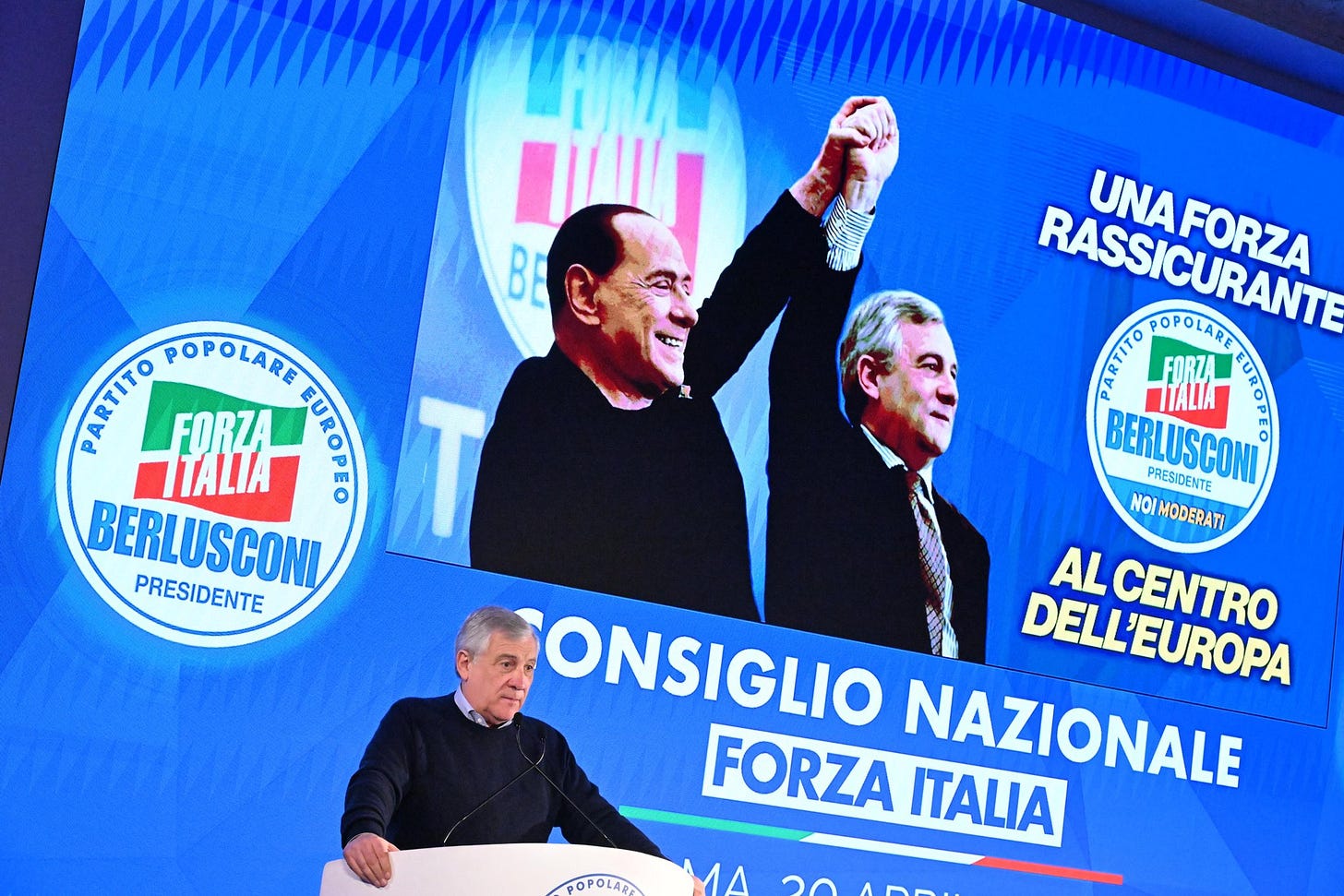And we’re finally off! This weekend on 8-9 June millions of Europeans will be voting in the European Parliament elections, a key contest which will play a major part in shaping the future political orientation of the 27 member state bloc. The latest polls suggest a far-right surge is imminent, with big gains for post-fascist, neo-fascist and ultraconservative parties expected in France, Germany and elsewhere. Whatever happens, Italy will play a far bigger role in agenda-setting than previous years. For several months now, Meloni has been skilfully working to develop an alliance with Marine Le Pen, Santiago Abascal and others while at the same time courting ‘moderate’ figures such as the current European Commission President Ursula von der Leyen. It’s a high wire act. If she succeeds then Italy will have considerable influence on the international stage (albeit as co-coordinator of a shift towards authoritarianism). If she fails — and the odd poll is indeed showing a decline in support — the consequences could be serious for the national government. Numerous hot-takes are already doing the rounds, but I’ll be saving mine for when the results are in next week. In the meantime, I’d heartily recommend reading Francesca Benedetti’s piece on how ‘Giorgia Meloni Is Orbánizing the European Union’ together with philosopher Lorenzo Marsili’s provocation ‘Macron and Meloni appear poles apart – but what if they joined forces to save Europe?’ to see how these two sides of her political strategy may yet converge in the weeks ahead. Watch this space.

More immediately, a vote (sadly) means campaigns. And across the board, throughout the continent, I’m sorry to say, without exception, the messaging has been dismal. From false trade-offs pitting “bullets against bees” to dodgy culture war sideshows, the 2024 pre-election discourse has been unedifying. In Italy, representatives of the major parties seem to have been actively and consciously acting like clowns; weaponizing the internet’s fascination with ‘cringe’ to get attention. The result, if I may, is a kind of ‘politics of cringe’; the manipulation of ‘cringe’ (a quality that is, by definition, supposed to repel) as a kind of ‘positive’ commodity within today’s (short) attention economy. From Forza Italia, who are running with a poster of the deceased Silvio Berlusconi, to the Lega, who have made the whole contest about edible insects, to PD officials riding BMX bikes, to Meloni now referring to herself (ironically) as “that asshole” on the campaign trail, studied poor taste interventions are the name of the game. When I asked a group of EUI students to share their thoughts about the whole affair during a workshop last week, the words they came up with were “confused”, “paralysed”, “worried”, “concerned” and “disempowered.” Looking at the almost total lack of substance in the actual programmes, it’s easy to see why. Cringe is a joke. But it’s also, increasingly, far more serious than that.

For those of you hungry for some more in-depth analysis of the real issues shaping the day I want to flag this recent webinar organized by my friend Maximilian Fries over at Europe Calling. Now, if you don’t know it, Europe Calling is a great initiative. I helped co-organise a session on the European elections a couple of weeks ago which brought everyday ‘normal’ participants from all across the continent to reflect on how the vote will and won’t impact on their lives [see the recording here]. This latest instalment was specifically concerned with Meloni’s politics, and the guests Francesca De Benedetti (Domani) Sebastian Heinrich (journalist); Prof. Francesco Palermo (Università di Verona) and Bolzano Alexandra Geese (Green MEP) worked hard to communicate the baffling Italian realities to a predominantly German audience. Watch the full recording “Qual è la sua reale posizione? – Punto di vista 🇮🇹+🇩🇪 sull’Italia di Meloni” for a fascinating comparative case study of how Fratelli d’Italia fits into larger continent-wide debates about the new far-right [ITA and DE only I’m afraid, with live interpreting].
Arts and culture: can’t we just get it over with?
I know. It’s all pretty disheartening, to put it mildly. I have to admit I also find myself frequently agonising: can’t we just be done with all this election stuff? It’s normal. And while I wouldn’t want to advocate totally unplugging from electoral politics, it’s equally true we all need some balance in our lives. With that principle in mind, I therefore want to make a shout out to the team at Italy Segreta for an excellent June 2024 issue which is dedicated to the region of Liguria! Liguria is one of my favourite Italian regions. It’s got beautiful architecture, the food is simple, healthy and veg-forward, the beaches are amazing… it’s a relaxed, unpretentious place. There’s a reason, in short, that I head there every summer without exception. Yes, mass tourism has annihilated the charm of the cinque terre but the region has so much more to offer than those five villages. The Italy Segreta issue highlights some fascinating lesser-known destinations and foodstuffs, extols the hidden wonders of Genoa and even offers a decolonial take on the historicisation of Christopher Colombus. There are some decent ‘off the beaten track’ beach tips too, though I’m pleased to see my own personal spots remain well-hidden for now (and I’m afraid I’ll be keeping those to the grave!). Click here to read the full issue.
The historian Catherine Fletcher has got an exhilarating new book out this month which tells the story of how ancient Rome — in the age of the Republic and the Empire — developed a network of roads which “transformed the cultures, and intertwined the fates, of a vast panoply of people across Europe and beyond.” The Roads To Rome: A History is a scholarly book, but it’s also a travel guide through 14 countries and a vast cross-section of the estimated 100,000km of ancient roads. Fletcher followed these routes for several years during her research to highlight innovations in engineering and state planning, the importance of infrastructure for military and trade and – most exciting of all, for this particular reader – she even notes how the roads have captured the imagination of generations of artists, scholars and politicians from medieval troubadours to romantic poets (not to mention Mussolini’s fascists). The book’s not out until next week but if you’re interested you can pre-order directly from the publisher here.
Recipe of the week: Egyptian Koshari
I was in Milan last week — briefly — while enroute to the UK to see family. During my stay I was briefly reminded why that city, for all its obvious faults, is one of the best places to eat non-Italian food in Italy right now. After all, Milan has been Italy’s number one destination for Chinese and Japanese cuisine for decades now. More recently, however, that cosmopolitan spirit seems to be expanding to the point that if you visit today you’ll be as likely to see South American, Ethiopian and Eritrean places as you are old fashioned osterie and trattorie. During my brief sojourn I stumbled across a place — by chance — across from my bnb called Koshari 101 which specialises in the eponymous Egyptian street food. Koshari, if you don’t know it, is a mix of rice, pasta, lentils, garlic and veggies all topped with chili sauce and optional meat (I chose the ‘sujuk’ beef sausage and it was tremendous). Anyway, the place was cheap, cheerful, friendly and perfect for a quick pit-stop. Make sure to drop by if you’re in the area of Porta Venezia anytime soon. Otherwise, if you’re feeling adventurous, you might be interested in prepping it at home [Meera Sodha has a version that looks more or less like what I ate here which I’ll be giving a go later this week].
I’m Jamie Mackay, a UK-born, Italy-based writer, working at the interfaces of journalism, criticism, poetry, fiction, philosophy, travelogue and cultural-history. I set up ‘The Week in Italy’ to make a space to share a regular overview of the debates and dilemmas, innovations and crises that sometimes pass under the radar of our overcrowded news feeds, to explore politics, current affairs, books, arts and food. If you’re a regular reader, and you enjoy these updates, I hope you’ll consider becoming a supporter for EUR 5.00 per month. I like to think of it as a weekly catch-up chat over an espresso. Alternatively, if you’d like to send a one-off something, you can do so via PayPal using this link. Grazie!


